#discipline committee
Text
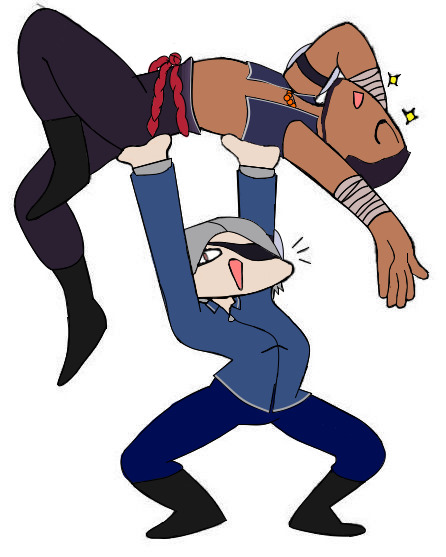
I just love Fujin and Raijin. Had to use the base to make them.
Base: https://www.pinterest.com/pin/58054282690800601/
#ff8#discipline committee#ff8 fujin#ff8 raijin#final fantasy 8#final fantasy viii#ffviii#fujin#raijin
18 notes
·
View notes
Photo

In BJUopoly, instead of getting sent to jail, you got sent to the Discipline Committee.
1 note
·
View note
Text


indo college orientation au because im the college orientation struggler
partner said that kaalaa is the type of senior who looks kind and nice and warm (she is) but if she gets mad at you its over !
#also shes like 27 so shes probably pursuing her masters#mochadoodles#Kaalaa Baunaa#Medicine Pocket#MediKaal#inspired by the time a pretty senior from the discipline committee got mad at me and i#am gay#all i got to say#i drew this during my 5 am to 5 pm orientation#i slept on the NOT FLOOR BUT GROUND#‘dog behavior’ -oomf#reverse 1999
37 notes
·
View notes
Text

Taming the Tongue
If anyone among you considers himself religious and yet does not bridle his tongue, he deceives his heart and his religion is worthless.
— James 1:26 | Majority Standard Bible (MSB)
The Holy Bible, Majority Standard Bible is produced in cooperation with Bible Hub, Discovery Bible, OpenBible.com, and the Berean Bible Translation Committee. This text of God’s Word has been dedicated to the public domain.
Cross References: Psalm 34:13; Psalm 39:1; Psalm 141:3; Luke 8:18; James 3:2
#religious#discipline#speaking#deceptive#worthless#religion#heart#James 1:26#The Epistle of James#New Testament#MSB#Majority Standard Bible#Bible Hub#Berean Bible Translation Committee#OpenBible.Com
12 notes
·
View notes
Text

Fuuki sash? Check. Tonfa? Check. Ready to take out the "garbage."
#anime#manga#otaku#birthday#favorite characters#khr#khr hibari#katekyo hitman reborn#hitman reborn#hibari kyoya#hibari kyouya#雲雀恭弥#こどもの日#kodomo no hi#sash#disciplinary committee#discipline#i'm ready#tonfa
6 notes
·
View notes
Text
Cristiano Ronaldo Suspended & Fined for Offensive Gesture After Al Nassr Win
Cristiano Ronaldo has been slapped with a one-match suspension and a fine by the Saudi Football Federation (SAFF) for making an offensive gesture after his club Al Nassr’s 3-2 victory over Al Shabab on Wednesday.
Social media footage captured Ronaldo cupping his ear and making a hand gesture near his pelvis, seemingly aimed at Al Shabab supporters. The incident unfolded amidst chants of “Messi,”…
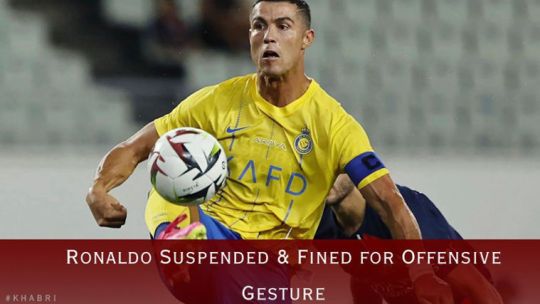
View On WordPress
#Al Nassr#Al Shabab#Cristiano Ronaldo#Disciplinary and Ethics Committee#Discipline#Fine#football#Football (Soccer)#SAFF#Saudi Arabia#Saudi Football Federation#Sports
0 notes
Note
Is it true Tumblr is crossing the picket line by marketing One Piece?
It's unfortunate to have that show's ads blasted on all our dashboards, to be sure, but it doesn't exactly fit the definition of "crossing the picket line", which is specific strike terminology that's been muddied a bit by talk on the Internet.
Crossing a picket line generally means crossing an actual, physical picket line to work at a struck company, thereby disregarding the strikers. [Updated 1 September to clarify that crossing a picket line is specifically referring to workers crossing picket lines, not patrons.] (Recent example in the news: hotel workers on strike in California picketed hotels and called for a boycott; therefore, staying at those hotels was crossing a picket line.) It can also be used figuratively, and in that case it differs from strike to strike, depending on the specific union demands.
[Side note: there's no call for a boycott from WGA/SAG-AFTRA, so subscribing to streaming services/going to movie theaters isn't crossing a picket line at this time; however, people canceling streaming services in solidarity and leaving a note that explains they're canceling in support of the strikes is a move we wholeheartedly support! See WGA negotiating committee co-chair Chris Keyser's interview about that here.]
Tumblr is a company, not a person, so SAG-AFTRA can't discipline it for marketing a Netflix show like it would discipline an individual (a stern talk from the board, or prohibiting them from SAG-AFTRA membership, etc.) There's no legal way for any union to enforce a no-marketing rule for companies. If Tumblr had a strong solidarity ethic, they'd turn down studio marketing campaigns, but that's a lot to expect from any profit-driven company and shouldn't come as a surprise to anyone.
So, tl;dr: crossing the picket line? Not exactly. Still a not-great thing to do? Absolutely, and you can always send Tumblr a feedback form expressing your disapproval that they're marketing for Netflix during the strikes.
6K notes
·
View notes
Text
The majority of censorship is self-censorship
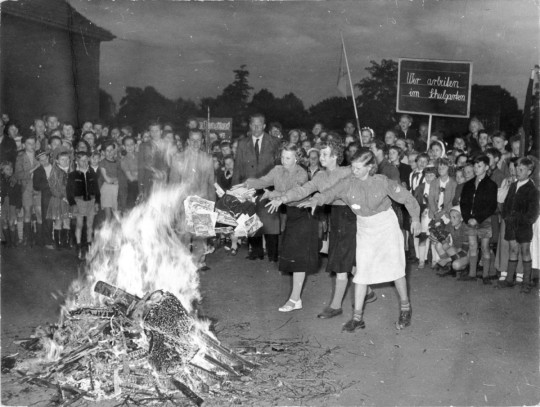
I'm on tour with my new novel The Bezzle! Catch me TONIGHT in SAN DIEGO (Feb 22, Mysterious Galaxy). After that, it's LA (Saturday night, with Adam Conover), Seattle (Monday, with Neal Stephenson), then Portland, Phoenix and more!

I know a lot of polymaths, but Ada Palmer takes the cake: brilliant science fiction writer, brilliant historian, brilliant librettist, brilliant singer, and then some:
https://pluralistic.net/2022/02/10/monopoly-begets-monopoly/#terra-ignota
Palmer is a friend and a colleague. In 2018, she, Adrian Johns and I collaborated on "Censorship, Information Control, & Information Revolutions from Printing Press to Internet," a series of grad seminars at the U Chicago History department (where Ada is a tenured prof, specializing in the Inquisition and Renaissance forbidden knowledge):
https://ifk.uchicago.edu/research/faculty-fellow-projects/censorship-information-control-information-revolutions-from-printing-press/
The project had its origins in a party game that Ada and I used to play at SF conventions: Ada would describe a way that the Inquisitions' censors attacked the printing press, and I'd find an extremely parallel maneuver from governments, the entertainment industry or other entities from the much more recent history of internet censorship battles.
With the seminars, we took it to the next level. Each 3h long session featured a roster of speakers from many disciplines, explaining everything from how encryption works to how white nationalists who were radicalized in Vietnam formed an armored-car robbery gang to finance modems and Apple ][+s to link up neo-Nazis across the USA.
We borrowed the structure of these sessions from science fiction conventions, home to a very specific kind of panel that doesn't always work, but when it does, it's fantastic. It was a natural choice: after all, Ada and I know each other through science fiction.
Even if you're not an sf person, you've probably heard of the Hugo Awards, the most prestigious awards in the field, voted on each year by attendees of the annual World Science Fiction Convention (Worldcon). And even if you're not an sf fan, you might have heard about a scandal involving the Hugo Awards, which were held last year in China, a first:
https://www.nbcnews.com/news/world/science-fiction-authors-excluded-hugo-awards-china-rcna139134
A little background: each year's Worldcon is run by a committee of volunteers. These volunteers put together bids to host the Worldcon, and canvass Worldcon attendees to vote in favor of their bid. For many years, a group of Chinese fans attempted to field a successful bid to host a Worldcon, and, eventually, they won.
At the time, there were many concerns: about traveling to a country with a poor human rights record and a reputation for censorship, and about the logistics of customary Worldcon attendees getting visas. During this debate, many international fans pointed to the poor human rights record in the USA (which has hosted the vast majority of Worldcons since their inception), and the absolute ghastly rigmarole the US government subjects many foreign visitors to when they seek visas to come to the US for conventions.
Whatever side of this debate you came down on, it couldn't be denied that the Chinese Worldcon rang a lot of alarm-bells. Communications were spotty, and then the con was unceremoniously rescheduled for months after the original scheduled date, without any good explanation. Rumors swirled of Chinese petty officials muscling their way into the con's administration.
But the real alarm bells started clanging after the Hugo Award ceremony. Normally, after the Hugos are given out, attendees are given paper handouts tallying the nominations and votes, and those numbers are also simultaneously published online. Technically, the Hugo committee has a grace period of some weeks before this data must be published, but at every Worldcon I've attended over the past 30+ years, I left the Hugos with a data-sheet in my hand.
Then, in early December, at the very last moment, the Hugo committee released its data – and all hell broke loose. Numerous, acclaimed works had been unilaterally "disqualified" from the ballot. Many of these were written by writers from the Chinese diaspora, but some works – like an episode of Neil Gaiman's Sandman – were seemingly unconnected to any national considerations.
Readers and writers erupted in outrage, demanding to know what had happened. The Hugo administrators – Americans and Canadians who'd volunteered in those roles for many years and were widely viewed as being members in good standing of the community – were either silent or responded with rude and insulting remarks. One thing they didn't do was explain themselves.
The absence of facts left a void that rumors and speculation rushed in to fill. Stories of Chinese official censorship swirled online, and along with them, a kind of I-told-you-so: China should never have been home to a Worldcon, the country's authoritarian national politics are fundamentally incompatible with a literary festival.
As the outrage mounted and the scandal breached from the confines of science fiction fans and writers to the wider world, more details kept emerging. A damning set of internal leaks revealed that it was those long-serving American and Canadian volunteers who decided to censor the ballot. They did so out of a vague sense that the Chinese state would visit some unspecified sanction on the con if politically unpalatable works appeared on the Hugo ballot. Incredibly, they even compiled clumsy dossiers on nominees, disqualifying one nominee out of a mistaken belief that he had once visited Tibet (it was actually Nepal).
There's no evidence that the Chinese state asked these people to do this. Likewise, it wasn't pressure from the Chinese state that caused them to throw out hundreds of ballots cast by Chinese fans, whom they believed were voting for a "slate" of works (it's not clear if this is the case, but slate voting is permitted under Hugo rules).
All this has raised many questions about the future of the Hugo Awards, and the status of the awards that were given in China. There's widespread concern that Chinese fans involved with the con may face state retaliation due to the negative press that these shenanigans stirred up.
But there's also a lot of questions about censorship, and the nature of both state and private censorship, and the relationship between the two. These are questions that Ada is extremely well-poised to answer; indeed, they're the subject of her book-in-progress, entitled Why We Censor: from the Inquisition to the Internet.
In a magisterial essay for Reactor, Palmer stakes out her central thesis: "The majority of censorship is self-censorship, but the majority of self-censorship is intentionally cultivated by an outside power":
https://reactormag.com/tools-for-thinking-about-censorship/
States – even very powerful states – that wish to censor lack the resources to accomplish totalizing censorship of the sort depicted in Nineteen Eighty-Four. They can't go from house to house, searching every nook and cranny for copies of forbidden literature. The only way to kill an idea is to stop people from expressing it in the first place. Convincing people to censor themselves is, "dollar for dollar and man-hour for man-hour, much cheaper and more impactful than anything else a censorious regime can do."
Ada invokes examples modern and ancient, including from her own area of specialty, the Inquisition and its treatment of Gailileo. The Inquistions didn't set out to silence Galileo. If that had been its objective, it could have just assassinated him. This was cheap, easy and reliable! Instead, the Inquisition persecuted Galileo, in a very high-profile manner, making him and his ideas far more famous.
But this isn't some early example of Inquisitorial Streisand Effect. The point of persecuting Galileo was to convince Descartes to self-censor, which he did. He took his manuscript back from the publisher and cut the sections the Inquisition was likely to find offensive. It wasn't just Descartes: "thousands of other major thinkers of the time wrote differently, spoke differently, chose different projects, and passed different ideas on to the next century because they self-censored after the Galileo trial."
This is direct self-censorship, where people are frightened into silencing themselves. But there's another form of censorship, which Ada calls "middlemen censorship." That's when someone other than the government censors a work because they fear what the government would do if they didn't. Think of Scholastic's cowardly decision to pull inclusive, LGBTQ books out of its book fair selections even though no one had ordered them to do so:
https://www.nytimes.com/2023/05/06/books/scholastic-book-racism-maggie-tokuda-hall.html
This is a form of censorship outsourcing, and it "multiplies the manpower of a censorship system by the number of individuals within its power." The censoring body doesn't need to hire people to search everyone's houses for offensive books – it can frighten editors, publishers, distributors, booksellers and librarians into suppressing the books in the first place.
This outsourcing blurs the line between state and private surveillance. Think about comics. After a series of high-profile Congressional hearings about the supposed danger of comics to impressionable young minds, the comics industry undertook a regime of self-censorship, through which the private Comics Code Authority would vet comings for "dangerous" content before allowing its seal of approval to appear on the comics' covers. Distributors and retailers refused to carry books without a CCA stamp, so publishers refused to publish books unless they could get a CCA stamp.
The CCA was unaccountable, capricious – and racist. By the 60s and 70s, it became clear that comic about Black characters were subjected to much tighter scrutiny than comics featuring white heroes. The CCA would reject "a drop of sweat on the forehead of a Black astronaut as 'too graphic' since it 'could be mistaken for blood.'" Every comic that got sent back by the CCA meant long, brutal reworkings by writers and illustrators to get them past the censors.
The US government never censored heroes like Black Panther, but the chain of events that created the CCA "middleman censors" made sure that Black Panther appeared in far fewer comics starring Marvel's most prominent Black character. An analysis of censorship that tries to draw a line between private and public censorship would say that the government played no role in Black Panther's banishment to obscurity – but without Congressional action, Black Panther would never have faced censorship.
This is why attempts to cleanly divide public and private censorship always break down. Many people will tell you that when Twitter or Facebook blocks content they disagree with, that's not censorship, since censorship is government action, and these are private actors. What they mean is that Twitter and Facebook censorship doesn't violate the First Amendment, but it's perfectly possible to infringe on free speech without violating the US Constitution. What's more, if the government fails to prevent monopolization of our speech forums – like social media – and also declines to offer its own public speech forums that are bound to respect the First Amendment, we can end up with government choices that produce an environment in which some ideas are suppressed wherever they might find an audience – all without violating the Constitution:
https://locusmag.com/2020/01/cory-doctorow-inaction-is-a-form-of-action/
The great censorious regimes of the past – the USSR, the Inquisition – left behind vast troves of bureaucratic records, and these records are full of complaints about the censors' lack of resources. They didn't have the manpower, the office space, the money or the power to erase the ideas they were ordered to suppress. As Ada notes, "In the period that Spain’s Inquisition was wildly out of Rome’s control, the Roman Inquisition even printed manuals to guide its Inquisitors on how to bluff their way through pretending they were on top of what Spain was doing!"
Censors have always done – and still do – their work not by wielding power, but by projecting it. Even the most powerful state actors are not powerful enough to truly censor, in the sense of confiscating every work expressing an idea and punishing everyone who creates such a work. Instead, when they rely on self-censorship, both by individuals and by intermediaries. When censors act to block one work and not another, or when they punish one transgressor while another is free to speak, it's tempting to think that they are following some arcane ruleset that defines when enforcement is strict and when it's weak. But the truth is, they censor erratically because they are too weak to censor comprehensively.
Spectacular acts of censorship and punishment are a performance, "to change the way people act and think." Censors "seek out actions that can cause the maximum number of people to notice and feel their presence, with a minimum of expense and manpower."
The censor can only succeed by convincing us to do their work for them. That's why drawing a line between state censorship and private censorship is such a misleading exercise. Censorship is, and always has been, a public-private partnership.

If you'd like an essay-formatted version of this post to read or share, here's a link to it on pluralistic.net, my surveillance-free, ad-free, tracker-free blog:
https://pluralistic.net/2024/02/22/self-censorship/#hugos
#pluralistic#ada palmer#worldcon#hugos#china#science fiction#fanac#publishing#censorship#systems of information control during information revolutions#scholarship
2K notes
·
View notes
Text
AFFA did not satisfy Sabah's complaint
AFFA did not satisfy Sabah’s complaint
The Appellate Arbitration Tribunal of AFFA did not satisfy the appeal of “Sabah” club.
Metbuat.org referring to the official website of the national association, the Disciplinary Committee imposed a fine of 1,600 manat on the representative of the capital on September 9.
It should be noted that the “Sabah” fans threw foreign objects on the field during the goalless draw with “Sabail” in the 5th…

View On WordPress
#About#appeal#Arbitration#Committee#complaint#did not#Discipline#fans#in effect#in the amount of#in the encounter#kept#of September#of the association#of the club#of the league#penalty#punishment#referring to#representative#Sabail#The tribunal#things#to the site#what they do
0 notes
Note
Hm..im kinda shy about asking this, because maybe it's just an english language thing that i don't get (it's not my first language lol) but ive always wondered what the difference between "prefect" and "housewarden" was,, like, wouldn't the mc/yuu technically also be a housewarden, since they're the only one running ramshackle? aaa sorry if it's a bit of a silly question lol, but i just don't understand the difference,,, thank you, and i love your work very much!! 🩷🩷
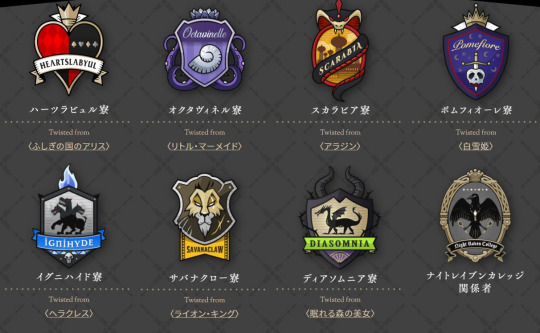
So to clarify, Yuu is called 監督生 (“kantoku-sei/kantoukusei”), which roughly translates into “prefect”. Dorm leaders (or housewardens, as they are called in EN) are called 寮長 (“ryōchō”), which refers to “dormitory managers/leaders/superintendents”. The two positions are treated very differently in-game (and generally, prefect is NOT the same as a dorm leader), but it may be different in real life depending on the institution you’re looking at for comparison.
As I've mentioned in this post, I see dorm leaders as NRC's version of RAs (resident advisors/assistants). They’re students who work with school administration to oversee and to conduct activities for their respective dorm buildings/residence halls […] Similarly, the dorm leaders in TWST have certain responsibilities but are also granted power within their own dorm as well as certain privileges which extend beyond that.
Common duties of a RA (I'll list some examples from TWST) include, but are not limited to:
Organizing and overseeing student educational programs and dorm activities (Riddle helps his students study to avoid failing, including Cater in Riddle's Dorm Uniform vignettes; he states that not a single Heartslabyul student has dropped out since he has become dorm leader. Various activities are orchestrated by dorm leaders, such as unbirthday parties, renting out their dorm for events, throwing banquets, etc.)
Planning accommodations for students and conducting new student orientations (dorm leaders canonically assign rooms to their dorm members, the prologue shows the dorm leaders escorting newly sorted freshmen to their dorms and showing them around, etc.)
Cleaning up and conducting monthly facility inspections (under the instruction of the dorm leader, members help with setting up and cleaning after events)
Enforcing rules and regulations, reporting incidents and recommending or enacting disciplinary actions as needed, and resolving conflicts between students in the dorm (most obviously seen with Riddle collaring students in the main story, but we've also seen other instances like Leona and Idia dealing with unruly mob students from their own dorms, each in their respective Dorm Uniform vignettes)
Acting as a liaison or representative between the school and students, or between the school and the community (Vil and Riddle especially stress the importance of their dorm members keeping in line, as it reflects poorly on them as the leaders if their students do not behave)
As you can see, many of the duties of a RA are carried out by TWST's dorm leaders. It is these responsibilities that define what a "dorm leader" is.
A prefect is described by the Oxford Dictionary as “a senior student authorized to enforce discipline”. The definition implies that a prefect has fewer responsibilities and power than a RA (ie a dorm leader). We see this lack of responsibilities and power reflected in Yuu (who, again, is often called "prefect" in characters' voiced lines place of their name). For example, Yuu is NOT present in dorm leader meetings and does not participate in planning committees for events such as the cultural festival of book 5 or the interdorm tournament of book 2.
It is likely that Yuu is not acknowledged in the same capacity as a dorm leader for various reasons:
Yuu is not a full student (Grim is their "other half) and lacks magical capabilities at a school that is known for training mages. They are also not from Twisted Wonderland. Therefore, they are not a good "representative" of NRC.
Ramshackle is no longer considered a dormitory since it has fallen into disrepair; even if it was still considered a dormitory, Yuu has no students to watch over since the Ramshackle Ghosts are not students and Grim only counts as half of a student.
Since Ramshackle is not a dorm anymore, it likely does not receive funding for dorm-wide activities, maintenance, etc. Yuu has very few resources to do anything.
Yuu does not command any real authority through their title alone (which largely has to do with their status as a non-mage + otherworldliness and the “illegitimate” nature of their dorm); even the main cast has to be shown their merits through actions before Yuu earns a modicum of their respect.
If we put it like that, Yuu's only formal prefect responsibilities are to basically to keep Grim out of trouble and do whatever odd jobs Crowley saddles them with. I guess you can also say that Yuu "enforces discipline" on the NRC students when they get out of hand, but this depends on your interpretation of what Yuu does in the main story. In my opinion, Yuu does very little to actually "enforce discipline" and often relies on other students to do the heavy lifting for them; Yuu is just the one initially sniffing out the root of the problems.
It should also be noted that while the formal definition of "prefect" refers to a "senior" student, Yuu is considered a first-year student along with Grim. Seniority does not play a role here. (Although please keep in mind that being a "first year" does not necessarily mean Yuu is 16 by default; there are exceptions to the age = grade thing.)
In summary, dorm leaders are presented in TWST as generally "higher up" on the food chain compared to a prefect. They have more powers and tasks to carry out; the prefect, by comparison, does not.
#twst#twisted wonderland#Yuu#disney twisted wonderland#disney twst#notes from the writing raven#question#book 2 spoilers#book 5 spoilers#prologue spoilers#Grim#Dire Crowley#Ramshackle Ghosts#Cater Diamond#Vil Schoenheit#Riddle Rosehearts#riddle dorm uniform vignette spoilers#Leona Kingscholar#Idia Shroud#leona dorm uniform vignette spoilers#idia dorm uniform vignette spoilers#twst en#twisted wonderland en
300 notes
·
View notes
Text
In-Depth Character Analysis On All The DR Characters Because What, Are You Gonna Try And Stop Me? Who Are You, My Mom? Yeah, I Didn't Think So- Part 1: Kiyotaka Ishimaru
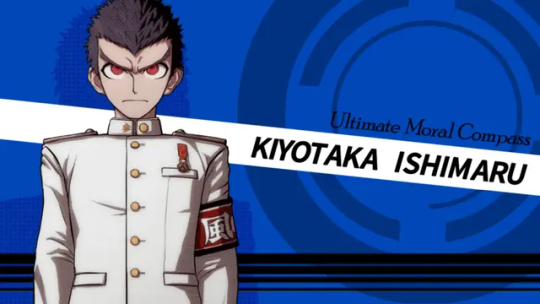
Yes, I'm aware the title is ungodly long, it's called comedy. Behold, a series inspired by my overwhelming hubris! Despite my better judgement, I love this series and (almost) every single one of its characters, so I decided to do this little series of posts on the side, just cuz!
So part 1 of like, 88 I think?, going through the characters from THH, DR 0, SDR2, UDG, DR3, and DRV3 with as much objectivity as possible, analyzing their character using only canon material from the games/anime/novel/canon adaptation they're present in. So sit back and enjoy while I go feral! Or just scroll, if you aren't interested. Whatever works for you.
Part 1- Character Design
Kiyotaka Ishimaru is depicted as a very aggressive honors student, and is shown as such through his very expressive facial features and his choice of clothing. He has large eyebrows and big eyes, and is given a uniform meant to make him look more like a soldier, reflecting his rigid dedication to the rules and his ethics. This uniform also includes an armband meant to signify his authority within the class as Hall Monitor and as the unofficial class rep. His sprites are very animated, with big gestures using his arm(s) and his mouth often wide open, whether in a wide smile or while yelling. This makes him one of the more expressive characters in THH specifically, as most of those characters are pretty restrained on a day-to-day basis and only become more exaggerated when put under high levels of stress.

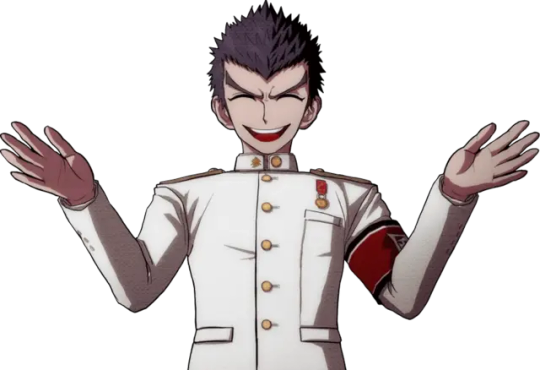
Something interesting about Taka is that his talent changes from the original Japanese to the English translation. His official talent is the SHSL Public Morals Committee Member, meaning his original talent was that of discipline and social order. This was translated to Ultimate Moral Compass in English, as most western schools don't have a Public Morals Committee. This change in translation unintentionally shifted the perception of his talent from discipline to morality. This change in distinction has had a bit of a negative impact on the Western perception of his character, as rather than appearing to impose order on the other students, it instead appears at the beginning as though we, the audience, are supposed to view him as a beacon of morality. We're not.
Part 2- Character Introduction
Taka is one of the first characters to actually speak to Makoto directly, berating him for being late on the first day of school, despite the fact that he and everyone else had experienced a strange warping of memory. He also goes on to interrupt your first conversation with Sayaka, stating that their time is being wasted by 'ridiculous back-and-forth'. Despite this, when it's his turn to introduce himself to Makoto, he goes off on a tangent about how cool Makoto's name is. He's described by Makoto as a 'flawless honors student' and is most publicly known for his work on his local Public Morals Committee. He believes in putting 'every ounce of effort' into living, and imposes this belief on those he interacts with, something Makoto finds irritating(This guy is... kind annoying.").
So in short, Taka's first impression on the player is that he's a mildly obsessive honors kid, and a bit of a hypocrite that isn't fully aware of his own presence or the effect it has on the rest of the cast. The game goes on to use this lack of social awareness as a source of comedy, as he takes Monokuma's initial greeting as Headmaster fully at face value. He struggles to grasp the concept of the killing game at first, opening the discussion upon Monokuma's departure from the welcome ceremony with dialogue that sounds like it was pulled from a customer feedback survey("So guys, how would you define what we just experienced?"). He's not a malicious or hateful figure; he wants to work with the class but isn't quite sure how to.
Part 3- Early-Game Events
The game spends the early-game establishing Taka's more negative traits. He's shown to be inobservant and wrapped up in his own ideals and need to command authority to even notice Kyoko is missing and, upon being informed of her disappearance, cares more about her punctuality than her safety. "Not only is she late, she didn't tell anyone she would be late! A most unbecoming personality trait..."
He's also established as hypocritical once again, and a bit egotistical, as he has trouble fathoming the others' lack of discoveries but overinflates the importance of his own.
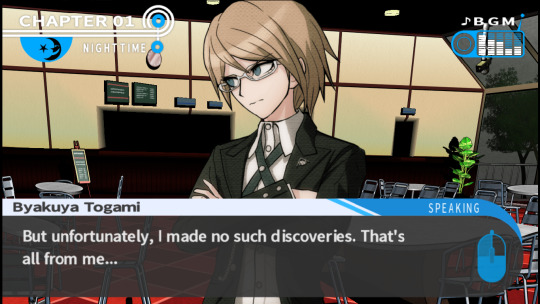
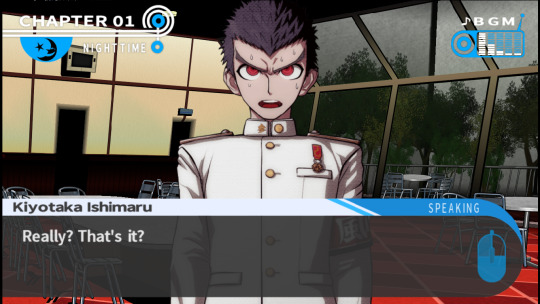
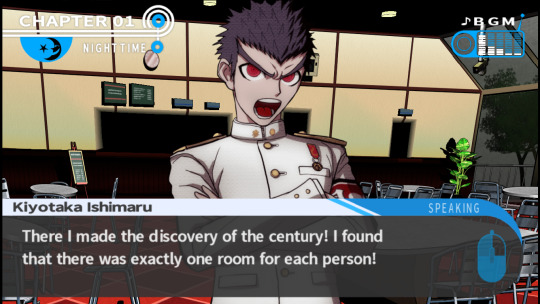
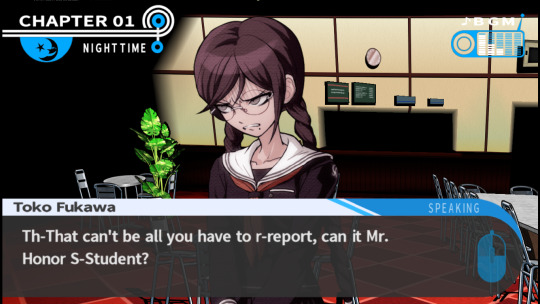
He then goes on to agree to Celeste's suggested nighttime rule for all the boys in the class, without letting them speak for themselves. While ultimately, no one has a problem with the rule, this is the first real instance of him doing something that, on paper, is beneficial to the group, but without considering how the others actually feel about it.
Taka doesn't show up in-story again until the day of the motive, when he goes around to the entire class demanding that they will now all have breakfast together every morning after the morning announcement. Although this is a good idea, allowing for everyone to bond and creating a morning headcount, he makes this decision for the entirety of the group. Leon and Makoto both complain about this if you speak to Leon outside the cafeteria, but ultimately go along with it because they don't want Taka to continue bugging them about it. So we can see that his efforts are perceived negatively by his classmates and go unappreciated.
Already we've seen Taka act overbearing and commanding over and over, inadvertently separating himself from the majority of his peers. He's direct and to the point, forming the breakfast meetings expressly to 'become friends and build trust' with the rest of the class. So we can see in no uncertain terms that he wants to befriend his classmates, but that his lack of social skills leads him to fail at every turn. He doesn't ask the class to join him for breakfast, he tells them. The strategy he employs doesn't leave room for choice, and ends up building resentment from his classmates.
It's not until the first body is discovered and the rules of the class trial are revealed that reality fully seems to set in for Taka. He, along with everyone else, are given the rules of a game they don't really want to play- that should they fail in the trial, all of them will be killed. And it sends Taka to a breakthrough- that some regulations can be harmful to those they're imposed upon.
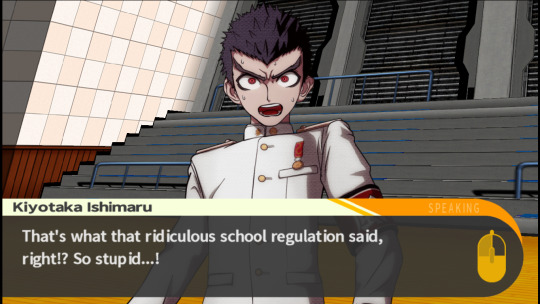
There's now a shift in his actions- he's still trying to push for the class to follow the rules he's set, yes, but there's a newfound urgency to them. When Byakuya disappears in chapter 2, his concern has shifted from punctuality to his classmate's safety. He's the one to lead the search for Byakuya when he doesn't answer. Despite all his harshness, we can see that his strictness now comes from a place of genuine concern for the people around him, a direct parallel to earlier in the game when Kyoko went missing- "I'd like to think so. But I'm worried something might have happened to him."
This growth of character, though not focused on, is undoubtedly present. The dedication he has to his discipline and his ego are still fully intact, but now that dedication has moved beyond just order. It's an act of protection, for him and everyone else. The invisible threat of death has become all too visible with Sayaka's absence from their last breakfast meeting. If he can keep track of everyone, then he'll know they're still alive. He can prevent another murder. It imposes upon him the responsibility of the leadership he craves.
Part 4- Relationship(s)
Unincluding if the player actively seeks him out through FTEs, Taka only ever develops a real relationship with one character of the other fourteen in-game, though he does have some important dynamics with others. We'll continue moving in chronological order.
4.1- Ishimondo (these bitches gay?)
Throughout the game, whenever Taka is saying or doing something stupid, Mondo is typically the one to call him out on it or shut him down. While this doesn't start to take real shape until chapter 2, it is visible here and there in the early game.
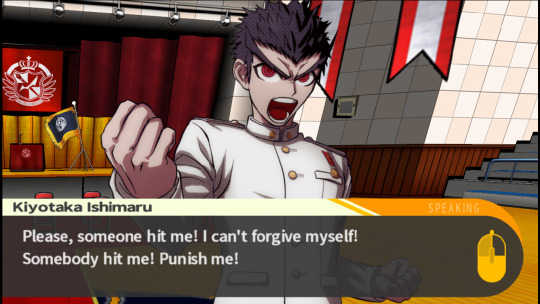
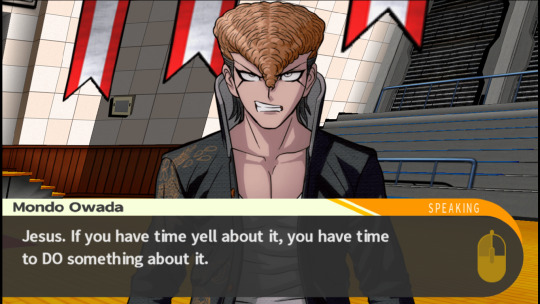
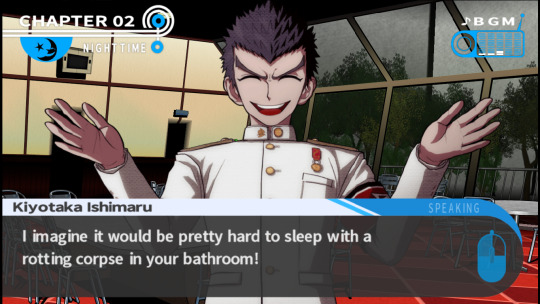
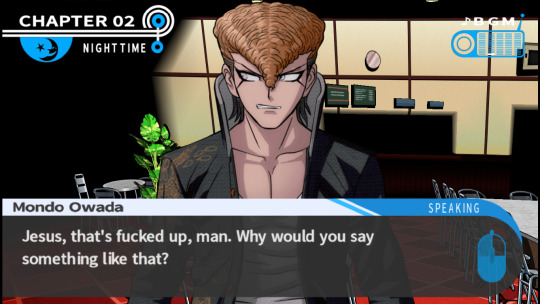
But their connection doesn't really start to take focus until chapter 2, as Taka's failings as leader and Mondo's constant correcting him puts them at odds. Mondo's attitude is the antithesis of Taka's, living a life of complete risk and impulsiveness, yet has a matching level of energy, and despite being more intimidating on a surface level, he's able to actually befriend characters like Chihiro, Hina, and Sakura, while Taka's left on the out. One of the best examples of this is found not in the game, but in the stageplay adaptation, where both characters attempt to help Chihiro feel better about her weakness in the daily life segment.
When Byakuya starts mocking Chihiro for her fear, Mondo threatens him, and insists that Chihiro's weakness doesn't matter because she's a woman. But when this makes her upset and Sakuraoi call him out on it, he offers to help Chihiro train as an apology, acknowledging that his behavior was irrational. But when Taka tries to give her advice by telling her not to be weak anymore and is told to be reasonable, he can only insist that Mondo's words don't matter anyway.
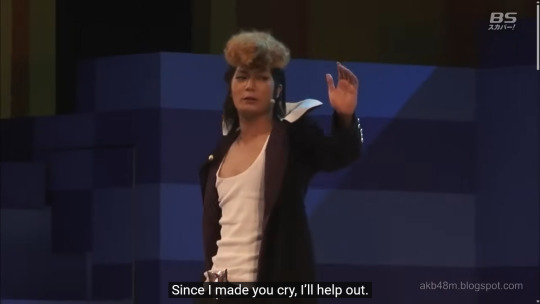
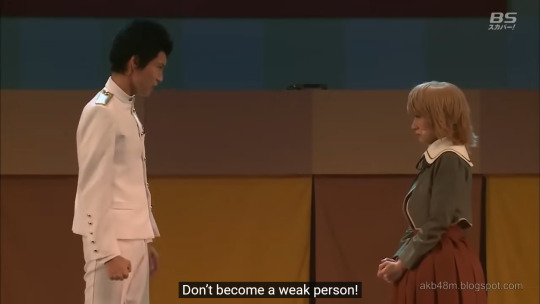
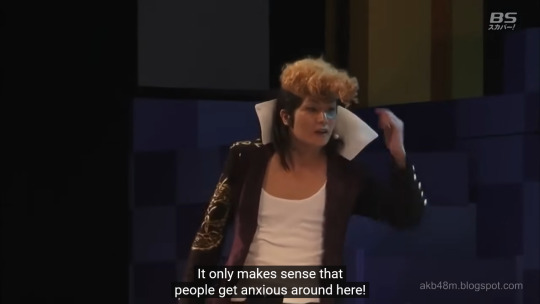
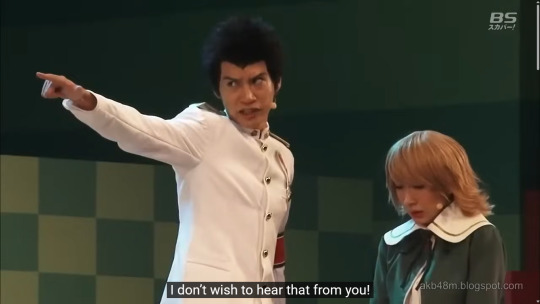
In the game itself, Taka's barely present for this exchange, as it chooses instead to focus on Chimondo's relationship. Regardless, the animosity between Mondo and Taka is still made very clear in-game.
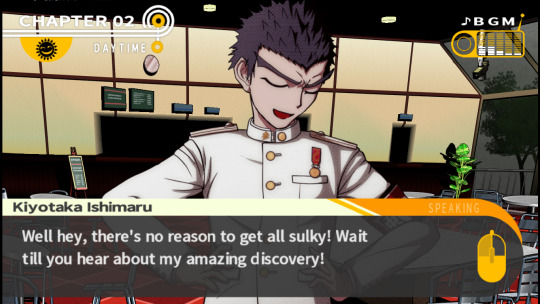
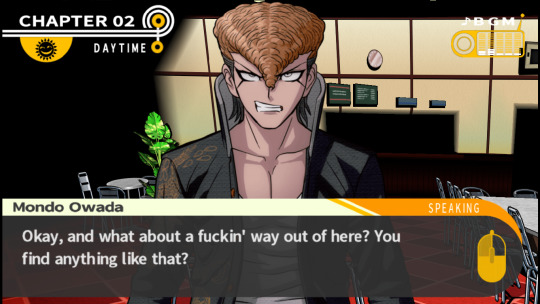
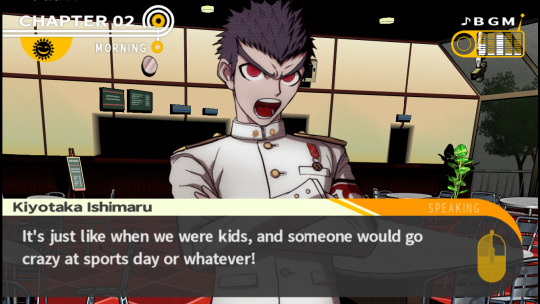
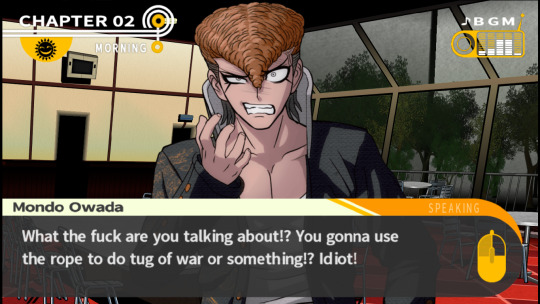
Mondo and Taka are both demonstrating the desire to protect their classmates here, but in different ways. Taka is the more logical of the two, focusing on keeping track of resources and devising a system of check for everyone to keep watch over each other in the breakfast promise. Mondo, meanwhile, wants to push the importance of actually getting everyone the fuck out of there. While their endgoal is the same, they disagree on how to go about it, and both their stubbornness drives them to butt heads as time continues to pass, leading to the sauna scene.
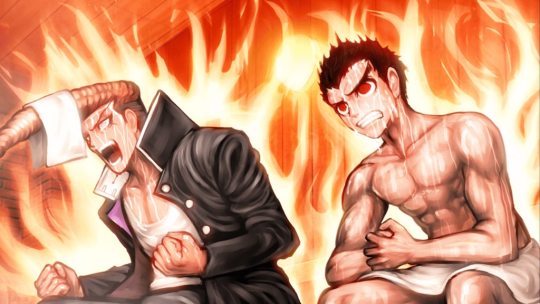
After being slowly built up in the background, Ishimondo's mutual anger finally comes to a head, with both not understanding the position that the other is in. Taka still believes Mondo's value to be what he provides to society, and as a biker gang leader, that's not much to a man that lives by lawful discipline. Meanwhile, Mondo can only see Taka as an egomaniac with a stick up his ass and doesn't know the background to why(and neither does the player without actively seeking out his FTEs). They each follow a different code of ethics, and view themself as the protector of the class, leading them to see each other as rivals. Yet, despite that, both of them still share their core value of total dedication, and so when finding a way to prove themself the better man, they end up with an endurance competition. For Taka, this reflects his belief that men connect by baring their souls, and do so by baring their bodies(something only learned in-game by approaching him for FTEs).
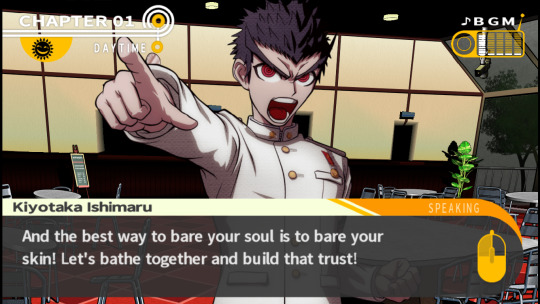
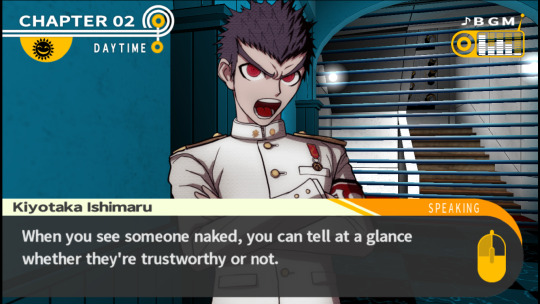
(This also leads to the implication that, while Mondo insisted on entering the sauna with all his clothes on, at some point, he was, in fact, naked while with Taka that night.)
The information as to what happened in that sauna is intentionally left unanswered, remaining fully private between both men in-game. The only thing either of them will say is that a brotherhood was formed between them, and that who won their initial contest no longer matters. Finally, Taka has found someone. Someone he can confide in and lean on, someone who'll support him and that he can support in turn("And if you can't do it alone, just find someone to support you, and you can support them back! That's how you can overcome any storm!" -Taka ch 1).
And then Chihiro's case happens.
At first, when the motives are introduced, Taka is one of the few to vocally insist no murder will take place. He has newfound confidence in the willpower of his classmates, and puts faith into everyone else for the first and only time. Even when presented with his own unknown secret, he finds it ridiculous that anyone would kill over the embarrassing memories and secrets. It's here that we truly see the highest high of this character- when he comes up with the idea to share secrets. When he presents this idea, he moves forward as usual, preparing to be the first one to reveal their secret and take the pressure off. But when his classmates insist they can't (Toko & Celeste) he doesn't keep chugging along, and he doesn't completely shut down, either. He looks around at his classmates, and he asks Chihiro. He actually steps back and asks for someone else's opinion.
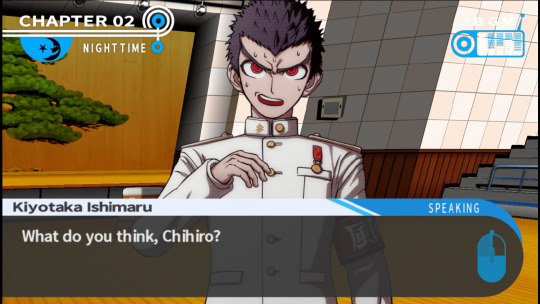
And when she isn't yet comfortable, he backs off. He respect her wishes, and he stands with the class, ready to help them face their secrets the following day. Finding a friend in Mondo has softened his rigid exterior a little bit, enough to actually consider the opinions of the others. He's gotten comfortable. All that comes crashing down with the discovery of Chihiro's body the next morning. After finally taking a step back and letting his classmates- his friends- make their own choices, it directly leads to the murder of one of them("Dammit! I'm sorry, Chihiro... It's all because I wasn't strong enough!").
Taka fully blames himself for allowing Chihiro to be murdered, and as the guilt of failure starts to set in on him, he looks to his ethics and order to solve it. Chihiro may be dead, but the murderer will be condemned through the class trial("Justice always prevails! Right, bro!?"). A solution, a path forward, still exists for him. He still has Mondo by his side, and he and the rest of the class can surely prevent this from happening again, right?
The trial only validates him at first, revealing the existence of a serial killer among the group, someone so clearly immoral for her killing obsession. But it's not her. Why isn't it her? "Could such a heinous villain really be innocent!?" But his confusion is quickly stamped out- of course, it's Byakuya, the guy that's been threatening everyone and refusing to cooperate, the guy that has no regard for the rest of their classmates. "He kept calling this a game, right? So he'd totally be willing to do whatever it takes to 'win'!" But no, wrong again- he didn't know that the murder was in the boys' locker room, and was taken aback by Chihiro being AMAB. It should be him, someone so clearly antagonistic, that's how it's supposed to go, right?? But no, it's wrong! Why? And, who could kill someone like Chihiro at their most vulnerable?
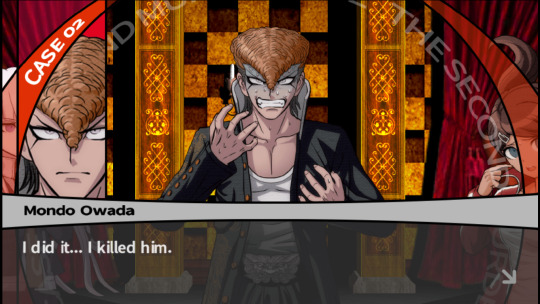
He's failed. Taka's failed in every way conceivable. Mondo, the first person he's ever truly felt connected to, a murderer? Chihiro's murderer? That can't be it. Even long after Mondo's stopped arguing, Taka continues to push back against Makoto and Kyoko's accusations. It's a coincidence, that's not actually proof, anything to get them to stop, to save his brother, to save himself from the reality he's about to have to face. When sent into the BTB, it's Taka we fight in his despair, not Mondo. Until the very end, Taka won't acknowledge it. He can't. He can't bring himself to vote his Mondo a murderer, a killer. How could the man who gave him the chance no one else would, ever be so cruel? "I- I refuse to believe it... There's no way... no way he would kill someone! Why!? Why why why why why!? WHYYY!? Why did you do it!?"
He learns the truth of Mondo's story alongside the rest of the class, unable to process it all. It makes no sense. They were friends who trusted each other, who helped each other. And what about the man's promise? Doesn't that count for anything!? This doesn't sound right. This isn't Mondo, not his Mondo, not the man from the sauna. How could he have been so wrong about him?! It just can't be, but it is; the truth is but a slap to the face.
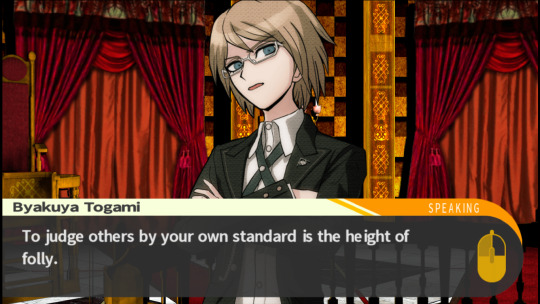
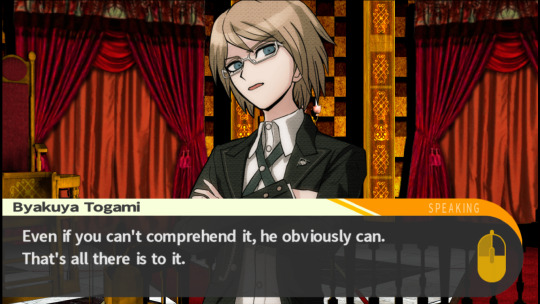
He was wrong. He stood by Chihiro's killer and defended him. He let his brother become the monster he saw himself as. He didn't stop it when he could have. He was blinded by his own beliefs, and as he watches Mondo's death, his spirit dies with him, the game cutting out all music as Taka screams, filling a deafening silence. "As Taka's sad screams invaded our skulls, we were each forced to realize once again..."
4.2- Kiyondo Ishida
Taka enters chapter 3 as a hollowed out shell of himself. He's gone near comatose, staring at nothing and saying nothing. He won't eat, won't speak, won't sleep, and although there are a couple weak attempts to get him back in action from Hiro("It's times like this where the committee chairman needs to get things going with a BANG!"), he's mostly left to grieve by himself, as the rest of cast is more concerned with the expanded school than the bossy guy they didn't like that much.
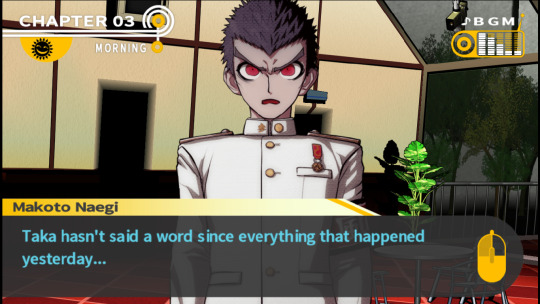
Monokuma even goes out of his way to torture Taka, to punish him for his grief, lying about the existence of a time machine just to fuck with his head and give him false hope, sending him further into despair- "Hmm... You sound disappointed. But actually, I was lying about the whole thing anyway. There's no such thing as time machines!" He's forced to become Monokuma's most successful project from the class, completely and utterly destroyed.
When he learns of Alter Ego, something in his head clicks. He can still talk to Chihiro. He can repent. He can apologize directly to him. So, with Makoto's help, he's brought to the laptop. His guilt finishes totally consuming him as he asks: "Do you... hate Mondo? And since I couldn't stop him... do you hate me?" His own self-hatred stemming from his failure is projected onto Alter Ego in one last attempt to come to terms with what's happened. The response he receives, unfortunately, is the culmination of all the toxic and unhealthy ideas of manhood the other boys carried with them via an attempted simulation of Mondo.
"You're not letting yourself get crushed under the weight of that responsibility, are you!? A man's only worth as much as the load he can carry! You get it, right bro!? Hell, what am I saying? Of course ya do!"
"So you're just gonna stand there, huh? Just wait for things to get better? Just take your time and get all depressed... Take the time to indulge your regrets... You might even start walking again without realizing it. Sure, that kind of mediocre thing might work for some people."
This speech, while attempting to inspire Taka to keep living for Chihiro's and Mondo's sakes, encapsulates the desperate need to be perceived as strong and untouchable that Mondo himself carried, and that Chihiro admired so much. It sinks its way into Taka, convincing him that the way to respond to his guilt is simple- pretend it isn't there! Mondo has clearly returned to him, and he's never letting him go ever again. He fully deludes himself, and he's fused with this idealized version of his bro. He permanently ties himself to Mondo's memory, and goes from the SHSL Public Morals Committee Member to something else entirely- Kiyondo Ishida, the unholy mixture of both men.
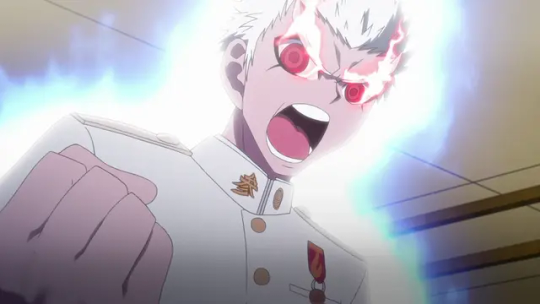
This revelation also leads him to an obsession with Alter Ego, viewing it as the vessel in which his bro was returned to him. He views it as another chance to protect his bro from ever being hurt again, as some divine second-chance he's been granted. All desire to be around the rest of his class is gone, replaced with this obsession. He's put at odds with Hifumi, who's also connected with the AI, and separates himself from the group that much more. When Alter Ego disappears, he can't handle it. He panics. He won't let his bro die, not again. And so he dooms himself, refusing to let go of the shadows of the past enough to see his own death looming before him, and he's killed in the early hours of the morning, led by desperation to his demise. And even so, the class can only worry about the semantics of when he died, barely mourning him.
5- Isolation (What's the point of this guy, anyway?)
Rather than learning from the mistakes both Chihiro and Mondo made by subscribing to the societal expectations of what makes a man, Taka ends up doubling down, burning away the optimism and more reasonable logic Taka used to have. Taka's story is that of a doomed fate to become the symbol of manhood and its self-destructing nature, leeching off of his first and only friend's unhealthy behaviors and sending him spiraling. And it's allowed to happen because of his social isolation.
From the very beginning of the game, Taka is singled out as annoying to be around. He's put in a negative light and viewed as unpleasant to spend time with. Every attempt to befriend or connect with a classmate is written off as a nuisance, a hindrance. Taka doesn't know how to make friends. He doesn't know how to do anything besides follow the rules and regulations he's been taught. He sticks to his regimen, because it's comfortable, and doesn't understand why others can't conform in the way that he does. He's very thoroughly isolated mentally and emotionally from his classmates at every turn, to the point where even in the very first trial he's standing with no one but the dead by his side(as Sayaka and "Junko" were positioned on either side of his podium).
All this is done with the deliberate intention to showcase his solitude, and more importantly, the loneliness that comes from it. It's to the point that when he finally does make a friend, he thoroughly idealizes him in his subconscious, coming to view him as some perfect person who'd even support him. It's inherently contradictory from his established beliefs going into the game, that a delinquent could be kind, but he accepts it wholeheartedly. He gets to know Mondo on some deeper level while in that sauna, and it's enough to rapidly develop a massive codependency on him. So when Mondo self-destructs and dies, so too does Taka.
Taka's purpose as a character is to suffer. He wraps himself in his moral beliefs, remaining steadfast in what he views as right and wrong, making judgement calls he's 100% sure of, and when they're challenged/disproven, he's thrown wholly out of whack. He exists to serve a purpose- what would've happened if Makoto didn't accept the truth about Sayaka? What happens when you let your idealism blind you to the truth? What happens when you blind yourself to the reality of the people around you, of the darkness in the people you care about? You self-destruct. He's tossed aside, killed as an accessory to the plot of someone who does nothing but manipulate the truth. He dies, and that's just it. His story is cut short; he doesn't get to heal or grow or come to terms with the truth. Such is the fate of the failed.
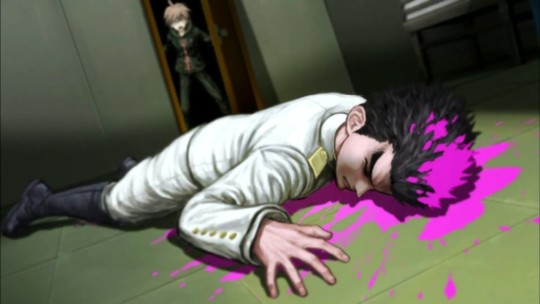
6- Afterword
...I didn't even touch his FTEs for this. Holy shit.
I'm gonna be honest, as much as I love Taka, I never expected this post would become as long as it did, or that I'd uncover such a dark fucking reason for why he gets as totally fucked over as he does. Don't get me wrong, I still really wish he'd lived and gotten to grow after this, but maybe his death was more well-written than I used to think. Good god.
#danganronpa#danganronpa trigger happy havoc#trigger happy havoc#thh#dr thh#dr thh spoilers#danganronpa thh#kiyotaka ishimaru#ishimaru kiyotaka#danganronpa kiyotaka#character analysis#character study#analysis#fan theory#DR character analysis#chihiro fujisaki#mondo owada#ishimondo#alter ego
243 notes
·
View notes
Text

—————————————
Popular choice✨
—> [Go along with Childe]
—————————————
Current time: 5:38pm
—————————————
Congrats!
You’ve managed to keep the peace so far by keeping Childe at bay and there’s been some progress on the trek towards the red ones hideout!
——————————/—/————————————Karate club leader! Childe is currently stable and is calmed by your presence leaving you with some ample reprieve! However, he is still not reassured from what had transpired earlier with you and Occult club leader Chongyun.
Current Affection lvl: 100 {+10}
Envy 0/50% < -5> // Insanity 22/50% < +2 >
Trust lvl: 40/100 (+-0)
—————————————
🚨MAIN MISSION QUOTA 🚨
——————————/—/—
《Your main priority as of right now is to Keep the peace between your party members and reach the Red ones hide out first! 》
____________________
【The goal of finding the other 4 admirers who’ve spotted you with Occult club leader! Chongyun has been put on hold until you reassure your first target Karate club leader Childe!】
——————————/—/————
Completion: An item, skill set level up!, Razor’s Ally rank up!, and Side missions
Failure:???
——————————/—/—
⚠️WARNING ⚠️ You are lagging behind Sports club Leader! Gorou & Delinquent gang Leader! Itto! They’ve seem to have taken the lead!
⚠️WARNING ⚠️ Discipline committee member! Heizou has befriended Karate club member! Razor due to their mutual interests and seem to have something planned together…
——————————/—/—————————————
☣️ IMMEDIATE ACTION REQUIRED☣️
Discipline committee member! Heizou and Razor seem to be concluding with each other! And Razor beckons you to join them, and you ALONE, to discuss something. Since Childe is passive at the moment you could risk leaving his side for a little bit but he’s still quite sensitive to change!
——————————/—/————————————
Objective: choose your priority
——————————/—/—————————————
—> [Stay by Childe’s side]
—> <Bring along Childe and head towards them>
—> (Group up with everyone for a game plan)
—> {join Heizou and Razor}
—> <Tell everyone to pick up the pace!>
——————————/—/—————————————
helpful inquiries ✨
#choose your adventure#otome! yandere genshin impact#otome! genshin impact#otome! yandere genshin#yandere genshin x reader#yandere genshin impact#yandere razor#yandere childe#yandere heizou#childe fanart#childe x reader#childe x you#childe x y/n#heizou x reader#heizou x you#heizou x y/n#razor x reader#razor imagines#childe imagines#childe scenarios#heizou scenarios#shikanoin heizou#genshin razor#childe genshin impact#genshin imagines#genshin scenarios
185 notes
·
View notes
Text
Jiroh latest Doujin about the Hakkenshi showed their Grades at school

Mori flopping at IT says he's definitely a Boomer like Shino
Tada failing a lot of subjects cause of his part time job
Yasuyori excelling on music is a bit of surprise
Tanetomo seems to dislike science
Masanori flop in PE but has a 6 pac
Yoshito being Average
Nobumichi being in the discipline committee and showing his Tie up kink to them
And Masashi ust being an ace student
77 notes
·
View notes
Text
i love that everyone's like 'well yeah danielson is the wrestler rep on the aew discipline committee he's the most unbiased' bc sure that does feel right. dude freely talks about eating tree semen and runs up the stairs on all fours i DO think he's above petty human squabbles
159 notes
·
View notes
Text
They Are Insecure For A Reason | Defector
"One of the less-amusing ironies of the violent institutional response to the nonviolent protest movement on campuses across the country is that the goals of the people protesting are much easier to understand than those of the variously curdled elites dispatching uniformed violence workers against them. The irony is in the fact that the students, with their specific demands and comparatively disciplined approach, have been cast as somewhere between essentially unserious and actively terroristic. In contrast, the institutions pivoting and pandering and giddily giving themselves over to the incoherent and spiraling political panic surrounding the protests represent principled leadership and forebearance; the gray elites insisting that these protests are actually about their dull abstractions of choice are the voice of seriousness; the police forces, rioting and ravening as ever, are somehow in fact order.
A lot of this disjunction can be explained by the undeniable disparities in power between those two sides, the first organizing toward a legible goal and the second existing essentially to oversee the unending work of saying no. Only one side can effectively call the cops on the other; here, as elsewhere, the impunity that comes with that exclusive access to violent recourse has made those with it not only cynical and lazy and cruel, but also paradoxically insecure and perpetually terrified at the prospect of any erosion in authority. It is, on its face, difficult to make the argument that it is fundamentally unserious to object to dropping a 2,000-pound bomb on a hospital, and much more morally and politically serious to object to that objection on some point of administrative order, or simply because it is too loud."
.....
"There is something terribly clarifying in how eager the people in power at these universities have been to betray the trust of everyone invested in those institutions. Institutions that otherwise exist from one exploratory committee to the next will change university policies on the fly so that their local uniformed violence workers will get their chance to thump some young skulls; administrators whose notional jobs are upholding communities of learning and care gladly consent to being upbraided by clownish golf hogs and half-fascist nullities in Congress and then do exactly what they were told to do, whatever the damage to those communities. If the students and professors in these protests, which are now nationwide, have a sort of advantage simply by being the only parties involved that actually care about anything, they are also up against an opposition that is all the more implacable because of how proudly cynical it is."
....
"The order they are after is all around us—a Homeowners Association with a S.W.A.T. team at its disposal, a business that grows at a steady rate without making anything anyone could use, a world in which things simply happen and continue to happen, a pristine desolation that is safe precisely because of how empty it is. But what they are afraid of grows even as they starve it, which is why these people, with all their power, are always so insecure. It is why, despite the relentless imposition of their annihilating concept of safety, they can't ever quite feel safe. They know how bad it would be for them to be seen clearly; they are fucking terrified of being treated as they treat others. They know that people can recognize their demands as what they are, and that there are still spaces in which to reject them. And they sense, maybe, that this false and failing security can't last. "The more they try to silence us," a Columbia grad student told the Times last week, "the louder we get."
57 notes
·
View notes
Text
Kate is not your drama queen Her self-possession drives people wild - Jenny McCartney UnHerd.

Just over a decade ago, the late novelist Hilary Mantel delivered a lecture to an event at the London Review of Books and triggered national outrage. In the course of a talk on “Royal Bodies”, which ranged widely across royal women from Anne Boleyn to Marie Antoinette and Princess Diana, she had made what many perceived as disparaging remarks about Kate Middleton, then the Duchess of Cambridge. The Duchess, she said, appeared to have been “designed by a committee and built by craftsmen, with a perfect plastic smile and the spindles of her limbs hand-turned and gloss-varnished”. Indeed, Mantel said, Kate “seems to have been selected for her role of princess because she was irreproachable: as painfully thin as anyone could wish, without quirks, without oddities, without the risk of the emergence of character”.
At this, the newspapers were soon in uproar. The prime minister David Cameron called the comments “completely misguided and completely wrong” and the Labour leader Ed Miliband agreed they were “pretty offensive”. Mantel doggedly refused to back down, saying that her remarks had been twisted out of context, and that she was in fact writing with sympathy about the perceptions that are forcefully projected on to royal women, the cage in which they are held to be goggled at. That was true, but also perhaps not the entire truth, for there was still a perceptible trace of authorial vinegar in the portrait: which of us would be happy to learn, even in sympathy, that we were held at low risk for “the emergence of character”?
Royals are public as well as private figures, of course, and authors are free to hang intellectual ideas on them to try out, as designers do with clothes. Yet while much of the lecture was sharply perceptive, I didn’t agree with the portrait of Kate. That word “selected” had rendered her passive, when in fact her behaviour thus far had suggested both an active intelligence and an unusual degree of self-discipline. The context of her entry into “The Firm” was different from that of other royal brides. Unlike Diana, who had barely emerged from the fractured chrysalis of her troubled aristocratic family when she first met the much older, more worldly Prince Charles, Kate was a contemporary of Prince William’s at the University of St Andrews. Her family background, which appeared warm and supportive, was comfortably middle-class. She seemed generally cheerful and unruffled, even when the press was at the barbed peak of its “Waity Katie” hysteria, trying to goad Prince William into a proposal or abandonment.
After the wedding, in her approach to royal duties, she clearly took the role she had inherited with marriage seriously. The royal whose attitude her own most resembled was the late Queen Elizabeth II, who had long understood the essential nature of the job: to turn up to public events looking the part, intuit precisely what was needed — gravitas, fun, consolation or reassurance — and deliver it while keeping one’s personal emotions on the back burner. This is what a monarchy demands, and the ability to act as an impeccable interpreter of the public mood, year after year, is a particular and testing art. A few have a natural aptitude for it, but most of us do not, and would quickly find its scrutiny and restrictions intolerable.
Grace under consistent pressure is an admirable quality. Were a ballet dancer to execute a string of flawless performances, or a pilot to conduct numerous flights without incident, it would not be deemed evidence of an absence of character: quite the opposite. Yet in Kate — especially for those who increasingly conduct their lives online — serene self-possession seems to drive a proportion of onlookers insane: what lurks behind it, what dark secret is waiting to destroy it, how best might it be disrupted? The uncomfortable truth is that what many people deeply crave in a young and beautiful royal wife and mother is not competence, but crack-up
The increasingly bizarre treatment of Kate, or the idea of Kate, is connected to the most dominant phenomenon of our age: a cultural prioritising of drama over duty. The supply of drama has spilled beyond the confines of the novel, theatre, cinema or television to become a commodity on which our public figures are judged. When Mantel spoke of Kate’s apparent absence of emerging “character” she was assessing her primarily through the hungry eyes of a novelist. In books, central female characters often generate dramatic tension by chafing against their circumstances, by the intensifying dazzle of their discontents, something that Kate refused to transmit. In contrast, Mantel described Diana as a “carrier of myth”: Diana, publicly trapped in the disappointments of her marriage, certainly carried more plot twists than any author had a right to expect. Unfortunately for her, the final one was her shockingly premature death.
Set against this artistic conception of “character” — distinctive qualities or flaws that, one way or another, deliver drama — is the societal judgement “of good character”, meaning someone who is broadly reliable and respected in relation to their behaviour to others. In recent years the electorate, in line with Neil Postman’s warning in his 1985 book, Amusing Ourselves To Death, has proved increasingly ready to select the former over the latter, even to the marked detriment of our civic health. The former prime minister Boris Johnson instinctively understood it as his job not to deliver the detail of workable policy, but to satisfy the public’s appetite for story: “People live by narrative,” he once told UnHerd’sTom McTague. In the US, Donald Trump — that relentless generator of low mockery and high fury — is now running for a second term as president, after his first one ended in his supporters storming the Capitol building.
Men are often permitted to survive the frantic generation of drama: it is everyone around them who suffers. Yet women — in art and life — have a greater tendency to be destroyed by it. There is no strutting female equivalent of the male “hellraiser”, but rather a woman who, soaked in the crocodile tears of the tabloids, is tragically “causing concern” among friends. Art and its audiences have always relished the restless struggle and disintegration of female characters who are, or become, unmoored from the harbour of marriage and children. Flaubert’s Emma Bovary — her imagination inflamed by reading novels — is bored with her marriage and disenchanted with motherhood; she seeks solace in affairs and excessive spending, the consequences of which hasten her suicide. Zola’s Nana, a courtesan who ruthlessly captivates Parisian society, has her beguiling face eaten away by smallpox. Janis Joplin and Amy Winehouse, immolated on their blazing talent, are hung posthumously high in the musical hall of fame, next to Sylvia Plath in the poetry section and Marilyn Monroe in cinema.
In Jean Rhys’s Good Morning, Midnight,a middle-aged English woman called Sasha Jansen, mourning an unhappy marriage and a dead child, finds herself in Paris, a vulnerable drifter seeking solace from stray men. Rhys herself, who died at 88 after a precarious but surprisingly long life, had much in common with her literary creations. As the writer and editor Diana Athill crisply put it: “Jean was absolutely incapable of living, life was just hopelessly beyond her. When she was young, she floated from man to man in a hopeless way… by the time she was old, she floated from kind woman to kind woman.”
In Rhys’s latter years — hard-drinking, irascible and impoverished — Athill and a small group of female friends formed what they called “The Jean Rhys Committee” which met regularly to ask “what should we do next?”. Rhys’s claim to such loyalty, I suppose, was the weight of her literary talent, her ability to exert an odd kind of fascination, and the fortunate soft-heartedness of her friends. The dramatic collided with the dutiful, and was kept alive by it.
From what I can see, the Princess of Wales exists at the opposite end of the feminine spectrum from Jean Rhys. Pinned firmly in place by her royal obligations, her wealth, her marriage and three children, she belongs to the realm of the respectable and dutiful rather than the erratic and dramatic. She is not a “character” in the artistic sense, nor does she desire to be, but both a survivor and upholder of an institution: hers is the territory of the prompt thank-you note, the kept promise, the commitment to public service, the uncomplicated pleasure in children, the stoic endurance of difficult times in the hope that better ones will come along soon. The public senses an emotional solidity in her, and it is partly why she is held in broad esteem. In this age of insistent self-definition, duty to others might be an unfashionable concept, but it is nonetheless one that keeps families and institutions from chaos and collapse.
With the advent of the internet, however, anyone with a keyboard can become a form of author, with the freedom to insert a toxic form of drama into real-life situations. What was extraordinary, during the Princess of Wales’s recent health problems, is how speedily and carelessly such speculations overrode the bounds of decency. It was already known that she had undergone major abdominal surgery, and was taking time to recover. And yet — egged on by the participation of silly celebrities and malicious US comedians — conspiracy theories about cosmetic surgery and affairs and nervous breakdowns spread like knotweed. According to social-media researchers, these were also vigorously introduced and amplified by fake accounts set up on Twitter and TikTok, some associated with Russia-linked disinformation eager to spread the termites of mistrust and doubt in Western institutions. Only the Princess of Wales’s revelation of cancer, which carries a testing drama all its own, served to shut up the majority of them.
Unlike these callous gossips, Mantel recognised her own complicity in dehumanising royalty. Upon encountering the late Queen, the novelist said: “I passed my eyes over her as a cannibal views his dinner, my gaze sharp enough to pick the meat off her bones.” The Queen looked back at her, she said, briefly hurt. Mantel warned of the way in which “cheerful curiosity can easily become cruelty” precisely as it has done in recent weeks. Her talk concluded with a prescient instruction for those who comprehend monarchy mainly as a source of entertainment: “I’m asking us to back off and not be brutes.”
In the midst of treatment and recovery, the most hitherto stable of royal women could be forgiven a keen sense of injustice: her job description, it seems, must now include the ability to weather the online public’s fits of brutish mania for drama. With its contempt for duty, and its savage appetite for story, it is hungry to chew up far more than just the Princess of Wales.
72 notes
·
View notes